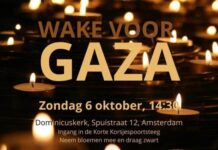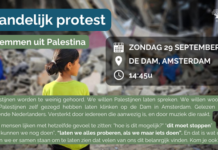Dana Besaiso
The Electronic Intifada / September 26, 2024
Fadwa Shamia, usually known as Um Osama, lived in a loving home in the Al-Shati refugee camp area of Gaza City with her husband, six children and grandchildren.
Before 7 October, she was content with her life. A teacher in a government school, every day she could go home to the warmth of her family.
Fadwa, 59, had two sisters Najwa, 58, and Rajaa, 49, with whom she was also close.
On 10 October, Fadwa’s 11-year-old granddaughter Hanan was killed in an Israeli bombing.
Her killing would foreshadow uni
maginable pain for the family, as the Shamias – and related Redwan and Abu Safia families – added their names to the hundreds of families that have been decimated by Israel’s genocidal violence in Gaza.
Fadwa’s sister Najwa had been baking pastries in her house, in the Al-Nafaq area in Gaza’s north, with her grandchildren playing nearby when the next-door neighbour’s house was bombed on 10 October.
Shrapnel and rocks flew at them, and parts of a building collapsed on Hanan, resulting in her martyrdom.
“The bite of pastry she had just taken fell from her mouth,” Najwa told The Electronic Intifada. “She didn’t even get the chance to swallow it.”
Everyone panicked.
“My eight children feared for their lives and their children’s lives,” Najwa said. “So we decided to separate.”
Half of Najwa’s eight children went to shelter at their Aunt Fadwa’s house while the others remained with their parents in their home.
Disaster
On 13 October, Fadwa was cooking lunch for guests, when her son, Ahmed, 23, rushed in to tell her that her other sister Rajaa’s house in al-Karama district had been bombed and people were killed or injured.
Fadwa, fearing for her sister’s life, tried repeatedly to ring Rajaa but with no luck
Hours passed with no news of Rajaa when there was a knock at the door. Fadwa opened it to find Rajaa and her sons, Osama, 22, and Baraa, 27.
Fadwa cried as she hugged her sister, relieved that she was alive. But her heart sank as she looked for her four remaining nephews.
“Rajaa knew from the look in my eyes what was weighing on my mind,” Fadwa said. “She assured me that they were alive, but in hospital.”
They had sustained serious injuries while Rajaa’s husband, Samih, was killed.
Fadwa now became host not only to Najwa’s family but to Rajaa’s too.
“Despite our losses, our gathering brought me joy,” Fadwa told The Electronic Intifada. “It eased the horror of the days. We spent our days cooking, washing laundry the old-school way, praying and reciting the Quran together that God would end this devastating war.”
Two weeks later, Najwa and her youngest daughters, Tasneem and Afna, went to visit Fadwa. The next day, 28 October, Najwa decided to leave her daughters at Fadwa’s for a while longer.
Najwa hugged her daughters tightly. It would be the last time she would see them.
“Tasneem called me later that day,” Najwa remembered, “begging me to come. ‘I miss you, Mom,’ she said.”
On 29 October, Fadwa went about her routine of cooking and doing laundry. After sunset, she called her son, Abdullah, 28, to check on him. He was volunteering as a doctor at al-Shifa hospital and was running late.
She said her prayers before bed, and the next thing she remembers is that she was lying on something hard, unable to open her eyes. She heard panicked voices calling — Um Osama? Is this Um Osama?”— before she blacked out.
The Shamia family home had been struck. The force of the bombing had blown Fadwa out of the house and into the street. She didn’t feel a thing until she found herself lying in a bed in Al-Shifa Hospital with Abdullah by her side.
Living on memories
Fadwa’s right leg was broken, and she needed immediate surgery. Half her body and hair was burned and the cornea of her right eye was damaged. She was barely recognizable.
When, later that night, she saw Ahmed in the hospital, she learned he was the only other survivor of the bombing.
Najwa, meanwhile, heard the news over the radio. She refused to believe it at first, her mind unable to comprehend the sheer scale of loss she was facing. Despite the danger and the constant bombardment outside, she rushed to the hospital in an attempt to find any of her loved ones alive.
It was a grim search. She found three of her grandchildren so badly burned they were barely alive. They didn’t survive the day. She asked about her children and was directed to bags containing body parts and severed limbs.
No body had been found intact. Some remain under rubble to this day.
In all, 36 people from their combined families – the Shamia, Redwan and Abu Safia families – had perished in the bombing
After her surgery, Fadwa remained in al-Shifa Hospital until the first Israeli invasion of the hospital in mid-November. Unable to walk, she was pushed in a wheelchair to Najwa’s house.
She had to learn how to walk again even while enduring the seemingly endless cycles of displacement from one place to another as the Israeli military invaded different parts of Gaza.
Fadwa and Najwa now live on memories of their sister Rajaa and her family, their children, and grandchildren. Najwa often sleeps with Tasneem and Afnan’s clothes, which, she insists, still hold their smell.
Fadwa keeps remembering her grandson Izzedin’s giggles and laughter as the two-year-old hid from his mother to eat chocolate, sheltering from punishment in his grandmother’s lap. She wishes she could still help Areej, 17, with her secondary school studies.
“Najwa and I always debate if it is better for the belongings of our children to be gone with them like my children’s belongings,” Fadwa said, “or to remain as a reminder, like Najwa’s children’s belongings.”
“We still haven’t reached an answer.”
Dana Besaiso is a writer and translator in Gaza












